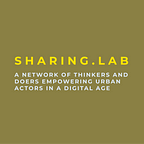OPENgardenCPH
At Sharing.Lab we’re always interested in hearing from people creating urban communities and bringing us closer together. We spoke to Signe from OPENgardenCPH — an urban farming design firm focused on developing urban concepts and reconnecting people to nature.
What were your motivations for starting OPENgardenCPH?
I wanted to do something that wouldn’t tie me to a desk, but instead give me the opportunity to go out in my garden and have a more practical approach to work. I always bring this mindset into my projects, where I develop concepts organised around a practical part. I view my garden as a workshop, and I’ve removed the fence around it to give direct access to neighbours, interested in using it for harvesting. Also, with OPENgardenCPH, I wanted to work with something that contributes to making sure that there are natural ressources left for my children, and their children in the future.
I have a background in architecture, so my experience is not directly related, but I grew up in a family that moved to the countryside to fulfill themselves, during the enviromental movement in the 1970’s. This, combined with a profound interest in harvesting, gave me experience with things like how to pickle beetroots and keep a kitchen garden. However, my focus drifted away growing up, until the day I read Jonathan Safron Foyer’s book ‘Eating Animals’. It had a huge impact on me, and after reading it I decided to plan out how to spend all my time on OPENgardenCPH and turn my garden into a workshop.
The garden is a place just outside your home which — even though it’s cultivated — is a natural space. It’s a workshop, enabling us to get closer to nature and to reimagine how we view ourselves as human beings. We have the opportunity to find our place in life — different from the one we’ve known during the industrialisation. We won’t know what’s best for us to eat, if we forget our relation to nature. I believe in an approach, building upon the idea that, through the garden we can teach ourselves about culture, health, food and the environment. I had a need to rediscover our common values.
How can a garden help create relations and communities in cities?
During harvesting you meet people in an unknown environment, compared to meeting people over a meal — a very wellknown environment. However, you’re meeting each other with incentives that could be to be hands-on, or do something good for the world, and these motivations form a meaningful community. Also, a garden can inspire us. I believe we’re naturally fascinated by it, because of our relationship to nature. We’re part of nature, so it touches something profoundly in us. As urban citizens the only contact we have with nature is through our food, so with OPENgardenCPH I hope to make it possible for us to reconnect with nature.
What have been the biggest challenges?
Right now there is a momentum, so people are eager to engage in our projects. On a Sunday morning, we’ll meet everyone from 17-year-olds to 55 year-olds. It’s also on a political agenda. However, the biggest challenge has been to get politicians to understand the importance, and to make sure that legislation aligns with the newest developments. For example, it’s still illegal to share seed. Since the war, the legislation has been appropriated for purposes such as growth and exports, and now we need to change that. So I’m also working on a creating a seed library, aiming to grow the biodiversity in Denmark.
What’s the future like for OPENgardenCPH?
I hope to contribute to a fundamental change, in terms of how we use our natural resources. In the next five years, I hope to keep working with biodiversity and local food production in Copenhagen. It’s important for our world, and it’s something we can change together. I believe everyone should focus on it, so we can avoid the global distribution of food and instead strengthen our local environment.
Originally published at sharinglab.dk
